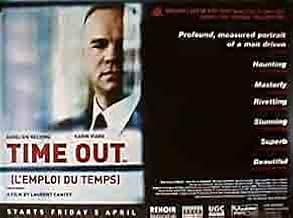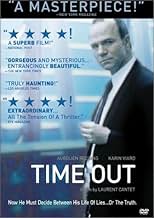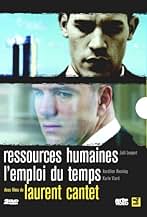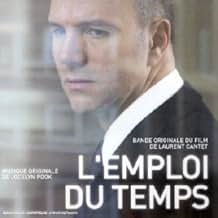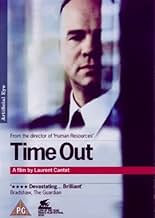VALUTAZIONE IMDb
7,3/10
5157
LA TUA VALUTAZIONE
Aggiungi una trama nella tua linguaAn unemployed man finds his life sinking more and more into trouble as he hides his situation from his family and friends.An unemployed man finds his life sinking more and more into trouble as he hides his situation from his family and friends.An unemployed man finds his life sinking more and more into trouble as he hides his situation from his family and friends.
- Regia
- Sceneggiatura
- Star
- Premi
- 3 vittorie e 8 candidature totali
Didier Reyes
- Philippe
- (as Didier Perez)
Recensioni in evidenza
TIME OUT (Laurent Cantet - France 2001).
The English language title Time Out is not entirely fitting. Perhaps Time Running Out would be a more appropriate title, since this is exactly what Vincent, the main character, is going through.
Vincent (Aurélien Recoing) is a highly motivated financial consultant. Or, at least, that's what he used to be. Fact of the matter is, he lost his job three months ago and now concocts an elaborate facade to cover up the fact he is now unemployed. While his wife, Muriel (Karin Viard), thinks he's at work, Vincent is aimlessly roaming the highways, hanging out at rest stops, and sleeping in his car, regularly calling his wife to give her an update about his next meeting and apologizing for coming home late, before turning in for his overnight stay in his car. Vincent lives like a ghost, increasingly detached from his wife, children and former colleagues, he doesn't seem to realize the truth is closing in. One day, they will find out. But Vincent has gotten to a point where he's constructed his own dream world. He resorts to reading all kinds of economic pamphlets about his apparent line of business, studying and memorizing them like he really is active in this line of work. As Vincent needs money, he makes up a plan to defraud old friends and his parents out of their savings by letting them in on some bogus investment scheme. He conducts his business out of a hotel lounge, where he catches the eye of Jean-Michel (Serge Livrozet, a brilliant role), a "real" , experienced operator who immediately recognizes Vincent is a fraud. He offers Vincent a job in his own operation, meaning some extra pocket money and perhaps even a way out of his increasingly sticky situation.
Director Cantet's style is distinctly unflashy. Set against the wintry landscapes of Rhône-Alpes around Grenoble and Annecy, the film makes very good use of its locations. Whether it's the bland office complexes in the "zones commerciales" at the outskirts of anonymous towns, or the snow-clad mountains surrounding them, it seems to blend perfectly with the film's tone. Accompanied by a beautiful classical score, Cantet shows himself a remarkably sharp and observant storyteller. Although the film maintains interest throughout, the running time of 132 minutes did seem a tad long, and Vincent's lengthy economic arguments when conning his friends and relatives (some of them business men themselves) out of their money weren't terribly convincing. His arguments range from unconvincing to downright nonsense. At least he would'n have convinced me, but even my 91 year old grandmother wouldn't have bought any of this for a moment. But, some of these inconsistencies aside, this is a skilfully constructed film and an engrossing psychological drama that slowly unfolds like a thriller with a brilliant performance by Aurélien Recoing to top it off.
Camera Obscura --- 8/10
The English language title Time Out is not entirely fitting. Perhaps Time Running Out would be a more appropriate title, since this is exactly what Vincent, the main character, is going through.
Vincent (Aurélien Recoing) is a highly motivated financial consultant. Or, at least, that's what he used to be. Fact of the matter is, he lost his job three months ago and now concocts an elaborate facade to cover up the fact he is now unemployed. While his wife, Muriel (Karin Viard), thinks he's at work, Vincent is aimlessly roaming the highways, hanging out at rest stops, and sleeping in his car, regularly calling his wife to give her an update about his next meeting and apologizing for coming home late, before turning in for his overnight stay in his car. Vincent lives like a ghost, increasingly detached from his wife, children and former colleagues, he doesn't seem to realize the truth is closing in. One day, they will find out. But Vincent has gotten to a point where he's constructed his own dream world. He resorts to reading all kinds of economic pamphlets about his apparent line of business, studying and memorizing them like he really is active in this line of work. As Vincent needs money, he makes up a plan to defraud old friends and his parents out of their savings by letting them in on some bogus investment scheme. He conducts his business out of a hotel lounge, where he catches the eye of Jean-Michel (Serge Livrozet, a brilliant role), a "real" , experienced operator who immediately recognizes Vincent is a fraud. He offers Vincent a job in his own operation, meaning some extra pocket money and perhaps even a way out of his increasingly sticky situation.
Director Cantet's style is distinctly unflashy. Set against the wintry landscapes of Rhône-Alpes around Grenoble and Annecy, the film makes very good use of its locations. Whether it's the bland office complexes in the "zones commerciales" at the outskirts of anonymous towns, or the snow-clad mountains surrounding them, it seems to blend perfectly with the film's tone. Accompanied by a beautiful classical score, Cantet shows himself a remarkably sharp and observant storyteller. Although the film maintains interest throughout, the running time of 132 minutes did seem a tad long, and Vincent's lengthy economic arguments when conning his friends and relatives (some of them business men themselves) out of their money weren't terribly convincing. His arguments range from unconvincing to downright nonsense. At least he would'n have convinced me, but even my 91 year old grandmother wouldn't have bought any of this for a moment. But, some of these inconsistencies aside, this is a skilfully constructed film and an engrossing psychological drama that slowly unfolds like a thriller with a brilliant performance by Aurélien Recoing to top it off.
Camera Obscura --- 8/10
Shakespeare spoke of the tangled web of deceit suggesting it was a terrible trap. Laurent Cantet presents us with another view. His hero in this film, Vincent (played to perfection by Aurelien Recoing) appears to revel in the freedom his dissembling brings...at least for a time. A middle-aged, middle class man who has lost his job keeps this information from his family and sets out on a complex journey of survival, both existentially and financially, involving schemes that he eventually has ambivalent feelings about. We also see another side to this complex man...the loving husband, father and son. Are we to judge and dislike this man? Should we cast the first stone?
I was particularly impressed by the subtle way Cantet depicted Muriel, Vincent's wife (performed with sensitivity and grace by Karin Viard). Her suspicions and uncertainties are written only on her lovely face...very little is ever said. And yet she's not seen as the long-suffering little woman...not at all. She appears independent and strong.
And then there's the affecting scenes in the snow-filled mountains... in that place of isolation (so representative of...well...of us all). There's majestic beauty and danger.
The mystery, the thought=provoking qualities of this film have made it for me a haunting and moving experience...One that I'd certainly recommend!
I was particularly impressed by the subtle way Cantet depicted Muriel, Vincent's wife (performed with sensitivity and grace by Karin Viard). Her suspicions and uncertainties are written only on her lovely face...very little is ever said. And yet she's not seen as the long-suffering little woman...not at all. She appears independent and strong.
And then there's the affecting scenes in the snow-filled mountains... in that place of isolation (so representative of...well...of us all). There's majestic beauty and danger.
The mystery, the thought=provoking qualities of this film have made it for me a haunting and moving experience...One that I'd certainly recommend!
This is a purely awesome film, the best of Laurent Cantet, the movie that reavealed him, and the best role ever from Aurélien Recoing. This is inspired from actual events,a nd this very same story was remade one year later with Daniel Auteuil: L'ADVERSAIRE. Both are terrific but not sjown in the same manner. The 2002 film from Nicole Garcia was more criminal oriented. Here, you are glued, stuck to this riveting tale. You always wonder what will happen in the next scene. An outstanding drama, involving normal folks to whom happens something really terrible. Top of the top. One of the best dramas ever. Serge Livrozet, this non professional actor, gives here a jaw dropping short but unique performance. The amazing story of a man more and more prisoner of his own lies.
A middle-aged middle class family man has a mid-life crisis.
Hardly an inspiring or original idea, yet Laurent Cantet creates a quite devastating and compelling landscape of one man's internal terror - terror at his situation and complete inability to express his feelings.
Through Cantet, a combination of economic script, astonishingly sparse and subtle performances, and Pook's deeply moving musical score, takes the viewer on a journey of displaced despair and futile attempts to paper over the cracks. Recoing is captivating, his face a turmoil of quiet bewilderment and pain, and he is ably matched by Viard as his increasingly unsettled partner. The penultimate scene between Recoing, Viard and their children is quite astonishing for its tension and disquiet.
In the end, however, the final scene says it all. Recoing's face tells us everything we need to know, and he really should have won every award going for this brilliant performance. Once again the French film industry shows us all how to make films.
Hardly an inspiring or original idea, yet Laurent Cantet creates a quite devastating and compelling landscape of one man's internal terror - terror at his situation and complete inability to express his feelings.
Through Cantet, a combination of economic script, astonishingly sparse and subtle performances, and Pook's deeply moving musical score, takes the viewer on a journey of displaced despair and futile attempts to paper over the cracks. Recoing is captivating, his face a turmoil of quiet bewilderment and pain, and he is ably matched by Viard as his increasingly unsettled partner. The penultimate scene between Recoing, Viard and their children is quite astonishing for its tension and disquiet.
In the end, however, the final scene says it all. Recoing's face tells us everything we need to know, and he really should have won every award going for this brilliant performance. Once again the French film industry shows us all how to make films.
Ironically, I just saw this a day after viewing Abbas Kiarostami's brilliant "Close Up", a story of a man who could no longer accept the endless banalities of his life and decided to become someone else (a film director!). That man had no sense of identity about himself but he knew what he cared about and what he believed in (the power of art and cinema). That brings him one up on the hero of this story. Vincent is a man who also cannot accept the banalities of his life, but he hasn't the foggiest idea of who he is or what he really cares about. It's as if he was born out of a computer software program. He knows what he's supposed to care about: nice home, nice car, nice bank account... But his work as an investor is so deprived of any human value that he loses all sense of values. His environment; a sterile, generic, upper middle-class vacuum that could make one believe that all of France has turned into Silicon Valley with a touch of the Scandinavian, has none of the passion or warmth that one identifies with being human. He has a loving wife, but according to his 'program', he believes that he would lose her if she knew that he was no longer able to function as a cog in the machine, and provide her with the lifestyle that she has grown accustomed to.
That is the first tragedy of Vincent, because his wife really does love him. The second tragedy of Vincent, is that even though he recognizes his need for freedom, he doesn't know how to use it. He's like a man who has been released from a lifetime of imprisonment, but still hangs around the prison yard because he is unable to comprehend what might be available to him. He'd lost his job because his love for being free was more important to him than keeping his appointments, but most of his time spent in his new-found freedom is in doing the same job he'd done before: investments. The only difference now is that he likes to believe that the investments are helping developing Third World countries. He knows that there really are no investments (he keeps the money that people give him and spends it on a nifty Range Rover, among other things), but momentarily, he can feel as if he is 'somebody' to his family and friends when he tells them of this meaningful new job he (allegedly) has.
Vincent has been described by many as 'everyman', but I think of him more as 'everyman who has just stepped through the looking glass'. Instead of taking a good, hard look at himself, he somehow ended up taking a look beyond himself because he could not find a reflection. He can't even recognize how much he's patterned his children to follow the same program he did. We see him teaching his kindergarten-age son how to 'hard sell' his toys at a school fair. Later, in a fascinating scene, we see him and his family doing what most people of his class do in their free time. They go shopping in an upscale, overpriced store to buy clothing that they know they don't really need. Vincent has it all, but it fills nothing in him. His family has it all, yet they don't seem to question the fact that they rarely spend any time together.
Laurent Candet has created a beautifully somber and sober look at the price of 'success'. The film is practically drained of all color, save for blues and grays, to illustrate the life force that has been systematically drained from Vincent throughout his life. And the score, a somber cello piece, refreshingly accentuates Vincent's mind instead of his actions (like most scores do). It is like a slow-moving merry-go-round that brings on a sense of familiarity that is simultaneously comfortable and unnerving. Because what the gist of it all is: is that no one wants to spend their life on a merry-go-round. Even a comfortable one.
That is the first tragedy of Vincent, because his wife really does love him. The second tragedy of Vincent, is that even though he recognizes his need for freedom, he doesn't know how to use it. He's like a man who has been released from a lifetime of imprisonment, but still hangs around the prison yard because he is unable to comprehend what might be available to him. He'd lost his job because his love for being free was more important to him than keeping his appointments, but most of his time spent in his new-found freedom is in doing the same job he'd done before: investments. The only difference now is that he likes to believe that the investments are helping developing Third World countries. He knows that there really are no investments (he keeps the money that people give him and spends it on a nifty Range Rover, among other things), but momentarily, he can feel as if he is 'somebody' to his family and friends when he tells them of this meaningful new job he (allegedly) has.
Vincent has been described by many as 'everyman', but I think of him more as 'everyman who has just stepped through the looking glass'. Instead of taking a good, hard look at himself, he somehow ended up taking a look beyond himself because he could not find a reflection. He can't even recognize how much he's patterned his children to follow the same program he did. We see him teaching his kindergarten-age son how to 'hard sell' his toys at a school fair. Later, in a fascinating scene, we see him and his family doing what most people of his class do in their free time. They go shopping in an upscale, overpriced store to buy clothing that they know they don't really need. Vincent has it all, but it fills nothing in him. His family has it all, yet they don't seem to question the fact that they rarely spend any time together.
Laurent Candet has created a beautifully somber and sober look at the price of 'success'. The film is practically drained of all color, save for blues and grays, to illustrate the life force that has been systematically drained from Vincent throughout his life. And the score, a somber cello piece, refreshingly accentuates Vincent's mind instead of his actions (like most scores do). It is like a slow-moving merry-go-round that brings on a sense of familiarity that is simultaneously comfortable and unnerving. Because what the gist of it all is: is that no one wants to spend their life on a merry-go-round. Even a comfortable one.
Lo sapevi?
- QuizInspired by a true story, that of Jean-Claude Romand. In reality, Romand went on to kill, on January 9, 1993, his wife, two children and both his parents. It is the first of three films in two years inspired by the case, followed by L'avversario (2002) and Nobody's life (2002), of which the former is the closest to the real events. Phantom (2002) was also inspired by the same incident.
- ConnessioniFeatured in The 2003 IFP Independent Spirit Awards (2003)
- Colonne sonoreL'Emploi Du Temps - Musique Originale
Composed by/ Arranged By Jocelyn Pook
Performed by 'Electra Strings' Ensemble
Cello Solo performed by Sophie Harris
Viola Solo performed by Clive Howard
Violin solo performed by Jacqueline Norrie
Phonographic Copyright (p) Jocelyn Pook / Haut et Court
Under Exclusive License To Virgin France
Published By Chester Music Ltd.
© 2001 Virgin France
I più visti
Accedi per valutare e creare un elenco di titoli salvati per ottenere consigli personalizzati
- How long is Time Out?Powered by Alexa
Dettagli
Botteghino
- Lordo Stati Uniti e Canada
- 448.542 USD
- Lordo in tutto il mondo
- 1.213.913 USD
- Tempo di esecuzione
- 2h 14min(134 min)
- Colore
- Mix di suoni
- Proporzioni
- 1.85 : 1
Contribuisci a questa pagina
Suggerisci una modifica o aggiungi i contenuti mancanti




